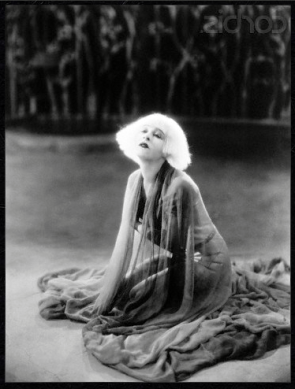I was captivated by Aubrey Beardsley’s illustrations that accompany Wilde’s Salome—how fanciful and strange they are! When I went to look up the illustrator, I discovered a 1923 film adaptation of Wilde’s play completely set to the aesthetic of Beardsley’s drawings. Directed by Charles Bryant, the silent and black and white film is considered America’s first feature-length art film; its dramatic costumes and exaggerated acting make for a wild and imaginative 74 minutes.
Salome, played by the famous silent film and Broadway actress Alla Nazimova, has all kinds of idiosyncrasies that contribute to the film’s rather outré nature—just check out her eyebrows! (43:14 at https://www.youtube.com/watch?v=BkMq_Cs3OUs should give you a good look.) The biblical seductress’ look shifts from medusa-esque (she shows off a head full of bobbing lights for most of the film) to Lady-Gaga-like when she emerges for her sultry dance of the seven veils in a glowing white bob.
I looked into other film versions of the biblical story, too. There have been a lot of adaptations, but a 1953 version with Rita Hayworth and 1988 version directed by Ken Russell version caught my interest. Both films work in narratives that diverge from Wilde’s narrative—in the ’53 version, Hayworth plays more of a damsel in distress than a femme fatale under the evil guise of her mother. It’s Herodias that wants the prophet killed in this adaptation, a more common version of the story; when Hayworth sees John the Baptist’s head on the platter, she screams in horror! The movie is apparently pretty bad (Hayworth herself didn’t even like it) but the dance of the seven veils in this version is to die for. Watch here: https://www.youtube.com/watch?v=VJi8xd38zwE
Russell’s 1988 film wasn’t very well received either, but the visuals are worth attention. It also brings Wilde into the film as a character. The adaptation is fairly erotic, so beware if you watch a little: https://www.youtube.com/watch?v=ZMO4Qi4AFhc
Here’s the plot from IMBD:
Late on Guy Fawkes Day, 1892, Oscar Wilde arrives at a high-class brothel where a surprise awaits: a staging of his play “Salome,” with parts played by prostitutes, Wilde’s host, his lover Bosey, and Lady Alice. The movie moves between the play and Wilde’s night. In the play, Herod begs his pubescent step-daughter Salome to dance for him, promising her anything she desires. Her mother, Herodias, objects. Salome is stung by John the Baptist’s rejection of her affections. The prophet’s scolding celibacy puts him between the expressed desire of age and youth. Wilde dallies with a young man as he watches the show, provoking Bosey’s jealousy. Two surprises await us.
The adaptations keep coming—In 2011, Al Pacino even made a version with Jessica Chastain, which includes a filming of the play and a documentary about Wilde.







Leave a comment